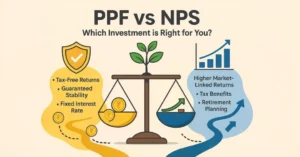In today’s digital age, financial advice is no longer confined to traditional advisors. A new wave of “finfluencers” – financial influencers on social media platforms such as YouTube, Instagram, and X (formerly Twitter) – has emerged, influencing the investment decisions of millions in India. While they’ve made financial topics more accessible, it’s crucial to navigate this space with caution. This guide will help you understand the world of finfluencers, the risks associated with them, how to identify credible advice, and where to find reliable financial information.
The Rise of Finfluencers in India
Financial influencers, also known as “finfluencers,” have gained immense popularity, particularly among young retail investors in India. They often break down complex financial topics into easy-to-understand content, utilising engaging formats such as videos and infographics. This accessibility has democratised financial knowledge to some extent.
However, the ease of access comes with its own set of challenges. The primary concern is the credibility and qualifications of these influencers.
The Risks of Following Finfluencer Advice Blindly
While some finfluencers provide valuable educational content, relying solely on their advice without due diligence can be risky:
- Lack of Qualifications & Registration: A significant number of finfluencers may not have formal financial qualifications or be registered with the Securities and Exchange Board of India (SEBI) as investment advisors or research analysts. Reports indicate that only a very small percentage (around 2%) of finfluencers are SEBI-registered.
- Misleading Information & Hidden Agendas: Some finfluencers might promote financial products or stocks for personal gain, through undisclosed sponsorships, commissions, or referral fees, without prioritising the investor’s best interest. About 63% of influencers reportedly fail to disclose such affiliations adequately.
- Focus on Short-Term Gains & Hype: Many finfluencers emphasise short-term trading tactics or “guaranteed high returns,” which can lure inexperienced investors into risky ventures. This can lead to emotional investing rather than decisions based on sound, long-term principles.
- Market Manipulation (Pump-and-Dump): Influencers with large followings could potentially manipulate stock prices by creating artificial hype (“pump”) and then selling their holdings (“dump”), leaving retail investors with losses.
- Lack of Accountability: Unregistered finfluencers operate in a regulatory grey area, making it difficult to hold them accountable for bad advice or losses incurred by followers.
- One-Size-Fits-All Advice: Financial advice needs to be personalised. Generic tips shared on social media may not be suitable for your individual financial situation, goals, or risk tolerance.
Cases like the Resourceful Automobile IPO and issues with crypto platforms endorsed by YouTubers highlight the real financial harm that can result from unverified finfluencer advice.
SEBI’s Role and Guidelines for Finfluencers (2025 Update)
Recognising the potential risks to investors, the Securities and Exchange Board of India (SEBI) has been actively working to regulate the finfluencer ecosystem.
Key SEBI Directives and Intentions (as of early 2025):
- Restrictions on Unregistered Influencers: SEBI has imposed restrictions on registered market intermediaries (like brokers, mutual funds, investment advisors) from associating or collaborating with unregistered finfluencers for promotional activities or advice related to securities. This includes monetary relationships, referral agreements, and even interactions with IT systems.
- Content Limitations:
- Finfluencers offering stock tips or “investor education” involving stock prices must now use data that is at least three months old. Live or recent stock prices are prohibited in such content to prevent the dissemination of disguised real-time trading tips.
- Making claims about returns or performance on any security without the authorisation of SEBI is prohibited.
- Focus on Registered Professionals: The aim is to ensure that investment recommendations and specific financial advice come primarily from SEBI-registered Investment Advisers (RIAs) or Research Analysts (RAs) who are bound by fiduciary duties and professional standards.
- Disclosure Requirements: While SEBI’s primary focus is on regulating the entities it oversees, there’s a strong push for transparency. Influencers are expected (and often mandated by advertising bodies like ASCI in conjunction with SEBI’s intent) to clearly disclose paid promotions, sponsorships, and any financial affiliations.
- Investor Education Window: A small window has been provided for investor education partnerships, but with the strict condition that these finfluencers do not provide any recommendations or claim any returns or performance.
- Removal of Content: SEBI has been collaborating with tech platforms to remove content from unregulated entities that are found to be violating norms.
These regulations aim to protect retail investors from misleading advice and ensure market integrity.
How to Identify Credible Financial Advice & Evaluate Finfluencers
With the proliferation of financial content, it’s crucial to develop a discerning eye.
Checklist for Evaluating Finfluencers and Their Advice:
- SEBI Registration:
- Verification: The most critical step for anyone giving specific investment advice is to check if they are a SEBI Registered Investment Adviser (RIA) or Research Analyst (RA). You can verify this on the SEBI Website by looking for lists of registered IAs.
- Why it matters: Registered advisors have a fiduciary duty to act in your best interest, adhere to strict compliance standards, and possess the minimum qualifications and experience required.
- Qualifications and Experience:
- Look for credentials like Certified Financial Planner (CFP), Chartered Accountant (CA), MBA in Finance, or NISM certifications.
- Consider their years of relevant experience in financial advisory or analysis.
- Transparency and Disclosures:
- Do they clearly disclose paid promotions, sponsorships, or affiliate links? Lack of disclosure is a major red flag.
- Are they transparent about their own holdings or potential conflicts of interest?
- Nature of Advice:
- Generic Education vs. Specific Recommendations: Distinguish between general financial literacy content (which can be helpful) and specific buy/sell recommendations for stocks or products. Specific advice should ideally come from a registered professional after understanding your profile.
- Realistic Returns: Be wary of promises of “guaranteed high returns” or “get-rich-quick” schemes. Genuine financial advice rarely involves such hype.
- Risk Disclosure: Do they adequately explain the risks associated with any investment they discuss?
- Source of Information:
- Do they cite credible sources for their data and analysis?
- Verify information with multiple reliable sources before taking action.
- Focus on Long-Term Principles:
- Credible advice often emphasises long-term investment strategies, diversification, and goal-based planning rather than just short-term trading tips.
- Engagement and Interaction:
- Do they engage thoughtfully with comments, or do they avoid tough questions? 1
- Are they pushing a particular product or service aggressively?
Red Flags to Watch Out For:
- Promises of guaranteed or unusually high returns.
- Pressure to act quickly (creating FOMO).
- Lack of transparency about fees, commissions, or affiliations.
- No mention of risks involved.
- Focus on penny stocks or highly speculative assets without proper context.
- Inability to provide SEBI registration details if giving specific advice.
Where to Find Reliable Financial Information in India
While finfluencers can be a starting point for awareness, always corroborate information with trusted sources:
- Regulatory Bodies:
- Securities and Exchange Board of India (SEBI): investor.sebi.gov.in for investor education material, circulars, and lists of registered intermediaries.
- Reserve Bank of India (RBI): rbi.org.in for monetary policy, banking information, and financial stability reports.
- Insurance Regulatory and Development Authority of India (IRDAI): For information on insurance products and regulations.
- Pension Fund Regulatory and Development Authority (PFRDA): For details on NPS and other pension schemes.
- Government Portals:
- Ministry of Finance: financialservices.gov.in for information on government schemes and financial sector policies.
- Press Information Bureau (PIB): pib.gov.in for official government announcements, including those related to finance.
- Stock Exchanges: Visit the websites of BSE India and NSE India for market data and company information.
- Reputable Financial News Publications: Established newspapers and financial magazines (both print and online) often have dedicated sections for personal finance, market analysis, and expert opinions.
- Mutual Fund Company Websites/AMCs: For scheme information documents (SIDs), Key Information Memorandums (KIMs), and fund fact sheets.
- Books by Credible Authors: Many well-regarded financial experts have authored books on personal finance and investing.
The Importance of Financial Literacy & Doing Your Own Calculations
Ultimately, the best defence against misleading advice is your own financial literacy.
- Understand Basic Concepts: Learn about budgeting, saving, different investment avenues (equity, debt, mutual funds, etc.), risk vs. reward, inflation, and the power of compounding.
- Do Your Own Research (DYOR): Before investing in any product or following any tip, research it thoroughly. Understand what you are investing in.
- Use Financial Calculators: Don’t just take someone’s word for potential returns or how much you need for a goal. Use tools like a(SIP Calculator, retirement Calculator, or Home Loan EMI Calculator to run your numbers. Our calculator page has a wide range of tools to help you plan for various financial goals.
When to Seek Professional Advice from a SEBI-registered Advisor
While self-education is vital, there are times when professional guidance is invaluable:
- If you have complex financial needs.
- If you are unsure about creating a comprehensive financial plan.
- If you need personalised investment advice tailored to your specific goals and risk profile.
- For critical decisions, such as retirement planning or estate planning.
Ensure any advisor you consult is a SEBI Registered Investment Adviser (RIA). RIAs have a fiduciary duty to act in your best interest, must disclose their fee structure transparently (often fee-only, not commission-based), and follow strict regulatory standards. You can ask for their SEBI registration number and verify it.
Conclusion – Invest Smart, Not Just Fast
Finfluencers have made financial discussions more mainstream in India, which is a positive development. However, the ease of accessing information also comes with the responsibility of critical evaluation. Always prioritise advice from qualified, registered professionals, supplement it with your own research from reliable sources, and use tools like financial calculators to make informed decisions. Your financial future is too important to be left to unverified social media trends.
Frequently Asked Questions (FAQs)
Are all finfluencers in India regulated by SEBI?
No, a very small percentage of finfluencers are registered with SEBI as Investment Advisers or Research Analysts. SEBI is working to bring more regulatory clarity to this space.
How can I check if a finfluencer or financial advisor is SEBI-registered?
You can request their SEBI registration number and verify it on the SEBI website, listed under Registered Investment Advisers.
What are the red flags when taking advice from an influencer?
Promising guaranteed high returns, a lack of transparency regarding sponsorships, aggressive promotion of specific products without discussing risks, and not being SEBI-registered while providing particular investment advice are major red flags.
Can I file a complaint against a misleading influencer?
Suppose you have a complaint against a SEBI-registered intermediary or believe there has been a violation of securities laws. In that case, you can file a complaint with SEBI through its SCORES portal (scores.gov.in) or the SCORES mobile app. For unregistered individuals, options might be more limited but could involve reporting to advertising standards bodies or cybercrime cells, depending on the nature of the issue.
Is it okay to learn about finance from influencers?
Yes, many financial influencers provide valuable educational content that simplifies complex financial concepts. The key is to use this as a starting point for your learning, always verify information from reliable sources, and do not act on specific investment advice from unregistered individuals without further due diligence or consulting a registered advisor.






